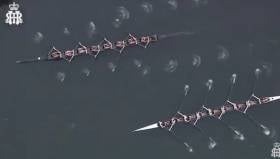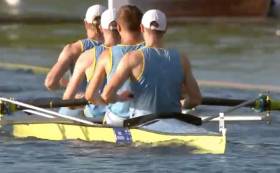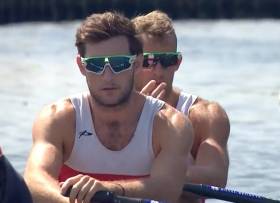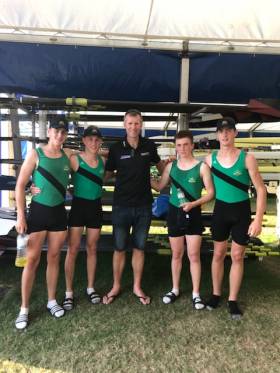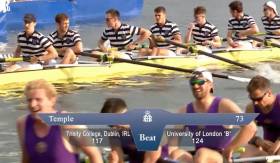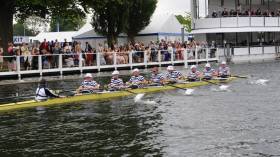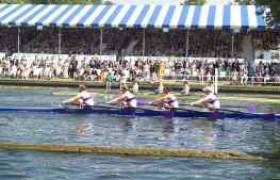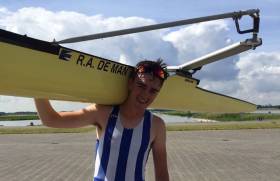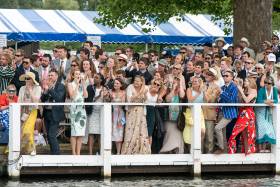Displaying items by tag: Henley
#Rowing: Commercial gave a good account of themselves but were beaten by half a length in the semi-final of the Thames Cup at Henley Royal Regatta.
Thames are the defending champions and masters of this event, and they controlled this race. They took a lead which never stretched beyond a length. However, they anticipated the Commercial attacks and countered them. Coming up to the line, the Dublin club closed right up – but Thames held firm to win.
Henley Royal Regatta, Day Four (Selected Results; Irish interest)
Thames (Men’s Eight, Club): Thames bt Commercial ½ l
Silver Goblets (Men’s Pairs, Open): A Diaz and A Haack bt M O’Donovan and S O’Driscoll (Skibbereen) 2¾ l
Visitors (Men’s Four, Club and University): Cambridge University and Leander Club bt UCD 1¾ l
Powerful British Crew Beat UCD in Henley Semi-Final
#Rowing: UCD made a good start in the semi-finals of the Visitors’ four at Henley Royal Regatta, but could not match the power of their opponents and made their exit. The crew listed as Cambridge University and Leander Club are, most likely, on their way to the World Under-23 Championships representing Britain. UCD stayed in touch with them until Fawley, about half way, but then saw them pull away. The verdict was one and three-quarter lengths.
Henley Royal Regatta, Day Four (Selected Results; Irish interest)
Silver Goblets (Men’s Pairs, Open): A Diaz and A Haack bt M O’Donovan and S O’Driscoll (Skibbereen) 2¾ l
Visitors (Men’s Four, Club and University): Cambridge University and Leander Club bt UCD 1¾ l
#Rowing: Paul O’Donovan and Gary O’Donovan won their first race at Henley Royal Regatta with plenty to spare. The Skibbereen double scull sprinted away from Leander’s Stephen Cox and Tiernan Oliver at the start and left them well behind for the rest of the contest. The winning marging was a quarter length shy of five lengths.
Henley Royal Regatta, Day Three (Irish interest; selected results)
Thames Cup (Eights, club): Montclair Mounties, United States bt Cork Boat Club ¾l .
Prince Albert (Fours, coxed; Student): Columbia University, US bt NUIG 1¾ l.
Double Sculls (Open): G O’Donovan, P O’Donovan bt S Cox, T Oliver 4¾ l.
Seeded Crews Give Irish Rowers Tough Time at Henley
#Rowing: Trinty lost out to Syracuse University and Neptune to Gloucester at Henley Royal Regatta today. Both victors were seeded crews; they were much heavier than their rivals from Ireland.
For the Temple Cup, Trinity lost William Doyle to a back injury after the first race and flew in Sean Canning, who replaced him. They came up against one of the top-ranked American crews in orange-clad Syracuse, who justified favouritism with a pillar-to-post win.
In the Fawley for junior quadruples, Neptune never gave up, but they, too, were fighting a losing battle from early on. They made Gloucester work – but the English crew were stronger.
Henley Royal Regatta, Day Two (Selected Results; Irish interest)
Thames Cup (Eights, Club): Cork Boat Club bt London RC ‘A’ 1 ¾ l.
Temple Cup (Eights, College): Syracuse University (US) bt Trinity 2½l; Yale University (3 D Lynch) bt Bath University 2¾ l.
Fawley (Quadruple, Junior): Gloucester RC ‘A’ bt Neptune 1 1/3 l.
Double Sculls (Open): S Cox, T Oliver bt JJP Keech and JA Dunley 1 ¼ l.
NUIG Rowers Win on the Line at Henley
#Rowing: NUIG had an exciting win over ASR Nereus of the Netherlands in the Prince Albert Cup for student coxed fours at Henley Royal Regatta. The early stages were tight, but the Dutch took the lead and held it down most of the course. Coming into the enclosures NUIG exerted fierce pressure – and it worked. They drew level and won by a canvas.
Trinity beat the University of London B by one and three-quarter lengths in the first round of the Temple Cup at Henley Royal Regatta. The Dublin University crew started well and fashioned a strong lead which their opponents could not whittle away.
Henley Royal Regatta, Day One (Selected Results; Irish interest)
Thames Cup (Eights, Club): Cork Boat Club bt Potomac, United States ¾ l, 6 min 35 sec.
Temple Cup (Eights, College): Trinity bt University of London B 1¾l, 6:40.
Prince Albert (Fours, coxed; Student): NUIG bt ASR Nereus, The Netherlands canvas, 7:13
Fawley (Quadruple, Junior): Neptune bt Tideway Scullers’ School ‘C’ 2/3l, 7:04.
#Rowing: Here is the Trinity eight which won the Ladies Plate at Henley Royal Regatta in 1977 ‘rowing over’ 40 years later. The current captain of Dublin University Boat Club, Cian Flynn, coxed the crew on Saturday as a stand-in for Jarlath Magee, who could not travel.
Though it was a joyous commemoration, the boat was named ‘Robin Tamplin’ to honour the senior coach, who sadly died earlier this year.
There was a dinner for the crew and their families afterwards and the story telling and singing went on late into the night.
Commercial Edged Out by A Foot at Henley Royal Regatta
#Rowing: Commercial made their exit from Henley this morning in a tightly fought quarter-final of the Wyfold Cup for club fours. The Dublin crew took a lead early over Thames and retained it to beyond halfway. The English crew pushed past them and led, but were warned by the umpire and had to adjust their steering. Commercial came back and looked like they might have done enough. It was not to be. Thames were given the decision by one foot.
Henley Royal Regatta, Day Three (Irish interest)
Wyfold Cup (Club Fours): Thames bt Commercial by 1 foot; 6 min 48 sec.
Clonmel Pipped in Cracking Finish at Henley Royal Regatta
#Rowing: Clonmel were beaten in a phenomenally close race at Henley Royal Regatta today. In the second round of the Fawley Cup, Tideway Scullers’ took the lead early and had a length over the the four young men in the Clonmel junior quadruple. But Clonmel clawed their way back. The crews seemed to be on level terms as they came to the line, but Tideway Scullers’ got the verdict by four feet.
Henley Royal Regatta, Day Two (Irish interest)
Diamond Sculls (Open Single Sculls): J Stimpson bt N Kenny 3¼ l.
Temple Cup (College Eights): University of California, Berkeley bt Trinity 2½ l.
Wyfold (Club Fours): Commercial bt Curlew by 4¼ l .
Fawley (Under-18 Quadruple Sculls): Tideway Scullers’ School beat Clonmel by 4 ft.
Trinity Eight Fall to American Crew at Henley Rowing
#Rowing: The University of California, Berkeley, beat Trinity in the second round of the Temple Cup for college eights at Henley Royal Regatta today. The American crew won easily in the first round and were hot favourites to win this race. They franked their form and beat the Dublin university unit with ease. The verdict was two and half lengths.
Henley Royal Regatta, Day Two (Irish interest)
Diamond Sculls (Open Single Sculls): J Stimpson bt N Kenny 3¼ l.
Temple Cup (College Eights): University of California, Berkeley bt Trinity 2½ l.
Commercial Rowers Ease to First-Round Win at Henley
#Rowing: Commercial had an easy win in the first round of the Wyfold Cup for club fours at Henley Royal Regatta today. Their opponents, Molesey B, made a mess of the start, veering across towards the Dublin crew and being warned. Commercial’s experienced crew of Mike Corcoran, Fionnán Groome, Colm Dowling and Shane Mac Eoin dealt with it all calmly. They moved into the lead and won, easing up, by one and a half lengths.
They are set to take on Curlew on Thursday.
Henley Royal Regatta, Day One (Irish interest)
Temple (College Eights): Trinity bt Pembroke College, Oxford by 2/3 l; 6 mins 29 sec.
Wyfold (Club Fours): Commercial bt Molesey B by 1½ l; 7:16.
Prince Albert (College Coxed Fours): Deerfield Academy (United States) bt Trinity by 5ft; 6:59.
Fawley (Under-18 Boys’ Quadruples): Clonmel bt Malvern Preparatory School B, United States by 2½ l; 6:55.


























